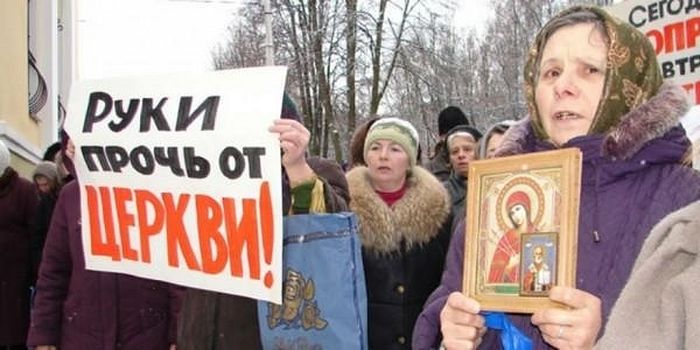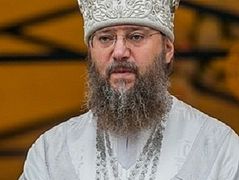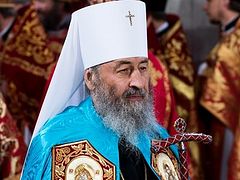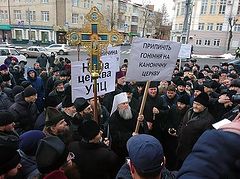In connection with the existing situation in the village of Shandrovets in the Turka district of Ukraine’s Lvov (Lviv) region, where a canonical Orthodox church was seized by schismatics in January 2019, I cannot help but recall an episode of 2014, when a young woman who had come from the combat zone in Donetsk to Kiev wondered: “How can you organize shows and concerts at Maidan Square, when people are being killed in Eastern Ukraine?!” Today we can see a similar situation in the Ukrainian political elite: Everyone has been celebrating the victory in the parliamentary elections all the time without saying a word about acts of extreme violence and outrage of schismatics from the so-called “Orthodox Church in Ukraine” (OCU) along with local bureaucrats nationwide, with church seizures, real persecutions, and the beating of and slander campaign against Orthodox Christians from the canonical Ukrainian Orthodox Church (the UOC-MP), its clergy, flock and even children.
Residents of this village called the press service of the UOC-MP’s Kiev Metropolia with the request to protect Archpriest Ilia Urusky, rector of their ancient Church of the Archangel Michael where he had served for twelve years. They related how in January this year, Fr. Ilia had been thrown out of his house into the freezing cold, how a wild mob of “Right Sector” militants and local “activists” had humiliated the pastor and his parishioners, how they cut off the locks on the church doors and taken it over. Fr. Ilia, who became homeless, had to travel to the village of Ulichno in the Drogobych (Drohobych) district some sixty miles away, where he has a house inherited from his parents. Once a week and before great feasts the archpriest drives his car back to Shandrovets to serve the Liturgy in the house of one of his parishioners. Fortunately they managed to save the church antimensions without which it is impossible to celebrate the Liturgy.
 The seized Church of the Archangel Michael in Shandrovets, the Lvov region
The seized Church of the Archangel Michael in Shandrovets, the Lvov region
Thus, as it was in the first centuries of Christianity and during the Communist persecutions in the twentieth century, Fr. Ilia and his faithful parishioners gather in the homes of different people in secret for worship to avoid possible reprisals by the schismatics and their patrons, who don’t scruple to use any means to sully the archpriest’s good name. The raiders caroused throughout the night when Fr. Ilia’s house was taken over, and then one of them published a photograph of empty liquor bottles in social media and made a cynical and slanderous remark: “This is how a priest of the Moscow Patriarchate ‘takes Communion’.”
But even that was not enough for the persecutors. One of the “well-wishers” reported to the Ulichno village council that Fr. Ilia was allegedly going to open a new “Russian parish” in his native village. In reality, the archpriest only equipped a prayer room inside his parents’ house, where he holds services, reads the Psalter and Akathist hymns alone. The village council administration obliged him to leave Ulichno immediately or they would “take appropriate steps”. Fr. Ilia knew about those “appropriate steps” not only from experience but also from news reports that time and again had been coming from western and other regions of Ukraine, where acts of violence were being committed by members of OCU, and, earlier, by the “Kyiv Patriarchate” of Philaret Denisenko, the “Right Sector” militants and other ultranationalist groups under the patronage of local bureaucrats, and through pure negligence by the police.
The physics teacher Galina Petrovna Kozanchin has worked at the high school of Shandrovets for many years, enjoying indisputable authority. At the same time, she has been a permanent parishioner of St. Michael’s Church for years, and she was among the first to stand up for Archpriest Ilia. The enemies of the canonical Church expressed their hatred in a petition (filed by schismatics, with several school staff workers among them) to the school principal, demanding that the physics teacher G. P. Kozanchin be fired “for her anti-Ukrainian political views and for belonging to the Russian anti-national Church”. The principal declined to consider the false denunciation, saying that those demands contradicted the laws and Constitution of Ukraine.
Let us remark in passing that religious rights in Ukraine are not only being violated—the lawful, historic, canonical Orthodox Church and its faithful are simply being eliminated in different parts of the country. And the events in Shandrovets are just one of the numerous illustrations of this legalized lawlessness.
As we know, the last wave of anti-Orthodox campaigns was initiated by Ukrainian ex-president Petro Poroshenko and the ultranationalist parliamentary majority where anti-Russian hysteria has been fueled over the past five years, and laws to abolish the UOC-MP were repeatedly proposed.
Although the project of the OCU tomos of autocephaly, initiated by Poroshenko and Patriarch Bartholomew, has basically fallen through, a wave of anti-Church hatred is still sweeping through Ukraine’s cities and villages, where “conscientious” officials are still fighting with the UOC-MP’s Orthodox parishes, and people are still being brainwashed by political clichés about the “Russian” Church. Now Shandrovets (and it is a village of over 100 people) bears a heavy cross of persecution.
This is what Galina Petrovna Kozanchin told us about the situation with the church seizure:
“I was born here, have lived and worked here as a school teacher. The life of our village and the life of my family are connected with this church. My grandmother took me to church when I was a girl. The church has always been active and open—no one ever closed it. The churches of the neighboring villages were closed, but the life of our church never stopped—an old priest and monk, Fr. Alexander, served here. And we have never had any religious strife. And someone were to tell me that this tragedy would happen on January 13 of this year, I would have never believed it. Our highly respected rector, Fr. Ilia, faithfully served in the village for twelve years, and I could have never imagined that he would be thrown out of his house into the freezing cold. But that is what happened. And it was committed by people who had earlier kissed his hand, people for whom he had prayed. He baptized children, performed marriages and performed funeral services for the reposed. These people hardly ever attended church services; they were primarily interested in financial matters: how much the priest gets paid and how this money is spent. We would club together, each giving ten hryvnia [the basic monetary unit of Ukraine.—Trans.], to pay our priest, while those people gave nothing. When the political turmoil in Ukraine broke out, they complained with one voice that we were in the ‘Russian’ Church, that we were arming ‘separatists’ and so on.
“Our Fr. Ilia has prayed and still prays for peace at every service, he prays for our country, for the civil authorities and armed forces—but do they really hear these prayers?! The only thing they had in mind was how to take over the church, how to drive Fr. Ilia out of the house of God… And on Sunday, January 13, they held a meeting of the village council on the initiative of Dmitr Popil, the Village Council Chairman. Deputy Head of the District Administration Yuri Lilo arrived at the meeting. We don’t know how many people were present there. They say everybody unanimously voted to transfer our church to the schismatics (OCU). But neither Fr. Ilia nor any member of our large community was invited to the meeting! Later, they claimed that there had been 520 voters, but the figures must have been fabricated because they even refused to show us the minutes of the meeting. The main reason for their complaint was allegedly the ‘Russian language’, in which, as they believe, our services are held. These individuals have no idea about Church Slavonic—the language in which our Church has prayed for 1000 years in Ukraine, Belarus, Moldova, Russia and indeed all over the world. These people have little if anything to do with the Church, they don’t believe in God, and they are driven by hatred and aggression rather than Christian feelings.
“Two days later, Deputy Head of the Turka District Administration came to the village with his ‘young activists’ and held another meeting. After the assembly a 100-strong infuriated mob headed for the rector’s house that stands close to the church, broke down the doors, burst inside Fr. Ilia’s home, dragged the lightly dressed archpriest out into the cold and didn’t even allow him to take warm clothes with him… This was committed in the presence of the police, who didn’t lift a finger to stop the atrocity. Later, the church locks were cut off too…”
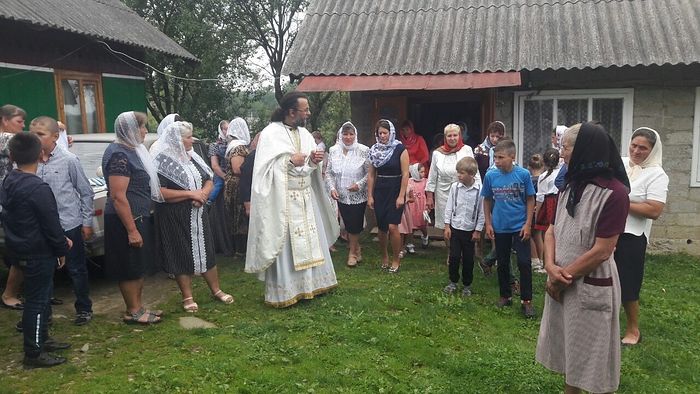 Archpriest Ilia Urusky, rector of the persecuted UOC-MP St. Michael’s Orthodox community, with his flock after a service in one of the houses of the village of Shandrovets
Archpriest Ilia Urusky, rector of the persecuted UOC-MP St. Michael’s Orthodox community, with his flock after a service in one of the houses of the village of Shandrovets
The Orthodox community appealed to the prosecutor’s office, about ten applications were filed to legal and administrative agencies, but no so far one has responded to them. The faithful still pray in private houses, and there is no one to help. Though weary, the people don’t lose heart, knowing that God is with them.
Lesya Alexandridi, a human rights activist and lawyer of the Dominanta legal group, who is investigating the religious situation in Shandrovets, is of the view that the constitutional principle of the supremacy of law is being willfully disregarded in the whole region:
“State and local government officials, with the support of the ‘Right Sector’ radical unit and with the inaction of law-enforcement agencies, organized and carried out a series of illegal actions aimed at the termination of civil legal capacity of a religious community of the UOC-MP as a legal entity, took possession of its property, helped to stir up religious strife and insult religious feelings of UOC-MP believers because of their religious convictions.”
The activities of the assailants of the raider-style campaign of seizure of churches fall within the scope of several articles of the Ukrainian Penal Code. In her analytical and legal opinion letter to the country’s highest judicial bodies, Lesya Alexandridi states:
“Violence, legitimized by the Government under the pretext of national interests and aimed at restriction of the rights and complete liquidation of a particular religious community, has shown signs of ideological terror both from representatives of the state authority bodies and particular segments of the local population, which pose as supporters of a ‘right’ and ‘nationally oriented’ religious community.”
Indeed the call of the new President of Ukraine Vladimir Zelensky for an interfaith dialogue, “so that faith would unite rather than divide Ukrainians”, on July 28—the 1031st anniversary of the Baptism of Russia, sounded somewhat awkward against a background of tyranny waged by schismatics and their patrons in the person of officials and politicians of different levels.
Responding to the new Ukrainian leader’s “good will call”, the Chancellor of the UOC-MP, Metropolitan Anthony (Pakanich) justly noted:
“These are important and necessary words, since for several years now, the religious sphere of Ukraine has been in a state of immense turbulence… If the violation of the rights of our flock is put to a stop, if the church seizures are put to an end, if all the churches that were seized are returned to our Church, then the prerequisites for dialogue are sure to appear. If this does not happen, then any good words about reconciliation will, unfortunately, remain simply words. After all, as St. Nilus of Sinai said. ‘The wolf has never talked amicably with the sheep, and likewise, merciless and insatiable thoughts cannot go before goodwill’.[1]”

